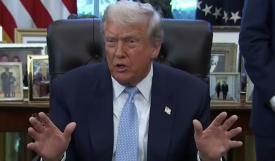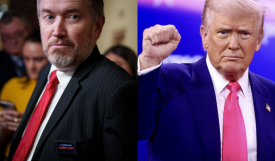Pena Nieto Unveils Transition Team
Mexican President-elect Enrique Pena Nieto on Tuesday unveiled his transition team for the next government, throwing in a mix of mostly young, trusted aides with heavyweights closer to his party's old guard.
Pena Nieto's win for the Institutional Revolutionary Party (PRI) in July returned the presidency to the group that governed Mexico for 71 consecutive years until 2000, a rule one author memorably described as the "perfect dictatorship."
That domination of Mexico was tainted by accusations of corruption, authoritarianism and vote-rigging, and as the new face of the PRI, Pena Nieto vowed to leave the past behind, making his transition team an early bellwether of that pledge.
Heading the 46-strong team is Pena Nieto's election campaign manager, Luis Videgaray, a reform-minded economist viewed as a potential financeminister and staunch defender of Pena Nieto's commitment to revamp Latin America's second-biggest economy.
Centrist Pena Nieto, 46, will be sworn in on December 1 and has pledged a raft of reforms to the labor market, the tax system and state oil monopoly Pemex, which he hopes will help boost economic growth to about 6 percent a year.
In a brief appearance in front of reporters, Pena Nieto said he was "completely committed" to making sure the next government was "equal to the challenges Mexico is facing today."
Pena Nieto wants to spur more private investment in Pemex - a symbol of Mexican self-sufficiency since the oil industry was nationalized in 1938 - broaden the tax base to bolster weak government revenues, and soften labor regulations.
These are likely to face resistance from leftist opponents headed by bitter rival and election runner-up Andres Manuel Lopez Obrador, who refuses to recognize his victory, and could also be unpopular with some in the PRI.
The telegenic Pena Nieto has also pledged to raise some 15 million people out of poverty, a hardship that afflicts about half of Mexico's 114 million-strong population.
The transition team, many of whom are in their 30s and 40s, includes members of Pena Nieto's inner circle from his days as governor of the State of Mexico between 2005 and 2011.
Some, like Videgaray, are likely to form part of his cabinet. They have helped the party shed some of its checkered image from its iron hold on power in the 20th century.
MAKING PACTS
Pena Nieto said the transition team could not be viewed as his future cabinet, and an official close to him said ministerial posts could be filled by people not on the list.
"Pena Nieto has close aides, people he trusts, but we are also seeing that he had to make pacts with his party for the candidacy," said Mexico City-based political analyst Fernando Dworak.
"The PRI is no longer the monolithic machine of yesteryear. It is a collection of governors, politicians of weight in their own right, so he had to negotiate with them, as well as other obligations forged on the campaign trail," he added.
The naming of the 44-year-old Videgaray as head of the transition team could suggest he is poised to take over as finance minister, he added.
A former finance minister in the State of Mexico educated at the Massachusetts Institute of Technology, Videgaray is part of a new generation of PRI technocrats whom analysts consider well-qualified to keep Mexico's finances healthy.
The transition team includes Miguel Osorio, a former governor of Hidalgo, who will spearhead coordination of political dialogue, while Jorge Ramirez Marin, a former president of the lower house, will oversee justice and security.
Osorio, 48, and Ramirez Marin, 51, are experienced political hands well connected to older power brokers within the PRI.
Pena Nieto has sought to show his readiness to reach consensus with other parties after he fell short of a majority in Congress in the July 1 elections.
Both allies and political adversaries have conceded Pena Nieto showed a knack for working with opposition parties while governor of the State of Mexico. For most of that tenure, he lacked a majority in the state legislature.
Within the front ranks of his transition team is Rosario Robles, a former mayor of Mexico City who then belonged to the Party of the Democratic Revolution (PRD), the leftist group which will lead the second-biggest bloc in the lower house.
Most of Pena Nieto's deals on economic reform are expected to hinge on his ability to work with the conservative National Action Party (PAN) of outgoing President Felipe Calderon.
One of Pena Nieto's first challenges will be to help Calderon steer a planned labor reform through Congress, as the PRI will need opposition support to get its own laws passed.
Calderon sent a new proposal to liberalize the antiquated labor laws to lawmakers on Saturday as he seeks to fast-track the legislation before leaving office.
Subscribe to Latin Post!
Sign up for our free newsletter for the Latest coverage!











